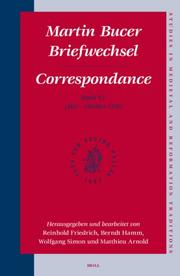| Listing 1 - 2 of 2 |
Sort by
|
Book
ISBN: 9789004273238 9789004273245 9004273247 9004273239 1306976820 Year: 2014 Volume: 184 6 Publisher: Leiden BRILL
Abstract | Keywords | Export | Availability | Bookmark
 Loading...
Loading...Choose an application
- Reference Manager
- EndNote
- RefWorks (Direct export to RefWorks)
Martin Bucer's De vera et falsa caenae dominicae administratione marks the collapse of his hopes for a negotiated settlement of the Reformation in Germany. He completed the work in March 1546 as fresh negotiations between Catholic and Protestant theologians reached an impasse in Regensburg, as the second session of the Council of Trent was meeting, and as Charles V prepared to make war on the Protestant League of Schmalkalden. At one level the work deals with the church's authority to regulate the celebration of the Lord's Supper, but at a more fundamental level it challenges moderate Catholics such as the humanist scholar Bartholomaeus Latomus to decide whether their ultimate loyalties lie with pope and council or with Christ and his Gospel.
Neo-Latin literature --- Lord's Supper --- Church history --- History of doctrines --- Latomus, Bartholomaeus, --- 2 BUCER, MARTIN --- 265.3 --- Christianity --- Ecclesiastical history --- History, Church --- History, Ecclesiastical --- History --- Communion --- Eucharist --- Holy Communion --- Sacrament of the Altar --- Blood --- Sacraments --- Sacred meals --- Last Supper --- Mass --- Godsdienst. Theologie--BUCER, MARTIN --- Eucharistie --- Religious aspects --- 265.3 Eucharistie --- 2 BUCER, MARTIN Godsdienst. Theologie--BUCER, MARTIN --- Latomus, Barthélémy --- Latomus, Bartholomaeus --- Église --- Histoire des doctrines --- Histoire --- Bucer, Martin, --- Critique et interprétation. --- Latomus, Barthélemy --- Bucer, Martin --- Lord's Supper - Early works to 1800. --- Lord's Supper - History of doctrines - 16th century. --- Church history - 16th century - Sources. --- Latomus, Bartholomaeus, - 1485?-1570. --- Église --- Critique et interprétation.

ISSN: 15734188 ISBN: 1283856328 900421058X 9789004210585 9004203648 9789004203648 9789004154940 9004154949 9789004309876 9789004058057 9789004103696 9789004306790 9789004265264 900430679X 9004103694 9789004116207 9789004171329 9004265260 9004171320 9004116206 9004058052 900430987X 9789004265271 9004086366 9789004138612 9004265279 9004138617 Year: 2014 Volume: v. 153 Publisher: Leiden BRILL
Abstract | Keywords | Export | Availability | Bookmark
 Loading...
Loading...Choose an application
- Reference Manager
- EndNote
- RefWorks (Direct export to RefWorks)
Nachdem Bucer sich im Winter 1531/32 in Straßburg mit den dort zahlreich versammelten Dissenters auseinandergesetzt hat, rückt ab dem Frühjahr 1532 wieder die Reichspolitik ins Zentrum seiner Aufmerksamkeit, als in Schweinfurt in Bucers Gegenwart die Verhandlungen über einen befristeten Waffenstillstand zwischen Kaiser und Protestanten beginnen. Erst Bucers theologische Gutachten und Argumentationshilfen eröffnen den Oberdeutschen dort die Möglichkeit, die Lehrformulierungen der Confessio Augustana und ihrer Apologie mitzutragen und so gegen das Kalkül des Kaisers die politische Isolation zu vermeiden. Während die lutherische Seite dies als Wechsel auf ihre Seite deutet, fühlen sich die Zwinglianer im Stich gelassen, zumal Bucer seine scharfe Kritik an deren Akzeptanz des Zweiten Kappeler Landfriedens bekräftigt. So muss Bucer sich für die Unterschrift von Schweinfurt vielfach rechtfertigen. Ausführlich und theologisch substantiell tut er dies in seinen Schreiben an Bonifatius Wolfhart, Leo Jud und Heinrich Bullinger.
Reformation --- Protestant Reformation --- Church history --- Counter-Reformation --- Protestantism --- History --- Bucer, Martin, --- Bucerus, Martinus --- 284.1 <093> --- 284.1 <093> Lutheraanse hervorming. Reformatie van Luther--Historische bronnen --- Lutheraanse hervorming. Reformatie van Luther--Historische bronnen --- Bucer, Martin, - 1491-1551 --- -Correspondence --- Bucer, Martin --- Oeuvres --- Édition critique --- Correspondence. --- Réformation --- Correspondance --- Correspondence --- Butzer, Martin,
| Listing 1 - 2 of 2 |
Sort by
|

 Search
Search Feedback
Feedback About UniCat
About UniCat  Help
Help News
News